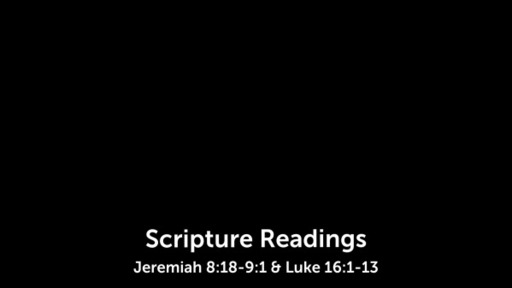Encouraged and Restored

Notes
Transcript
Sermon Tone Analysis
A
D
F
J
S
Emotion
A
C
T
Language
O
C
E
A
E
Social
Jesus tells this parable to convey the cost of discipleship.
This parable about a dishonest manager who had one admirable quality, persistence.
This parable about a dishonest manager who had one admirable quality, persistence.
The manager squandered the property of the rich man
But, he had the audacity to cover it up for his own gain.
He literally stole property of the rich man to get a job with someone else.
He literally stole property of the rich man to get a job with someone else.
There is no excusing that.
He could not handle physical labor of his men, but he also was too ashamed to beg.
He was not ashamed enough of his dishonesty to beg for mercy and do differently.
He was not ashamed enough of his dishonesty to beg for mercy and do differently.
Instead of just simple mismanagement (unintentional), he doubled-down with intentional theft and fraud.
Instead of just simple mismanagement (unintentional), he doubled-down with intentional theft and fraud.
Honestly, if this parable were real, this man probably would have gotten away with it.
The manager masked his mismanagement
The rich man looked generous to his debtors
Often, how people manage material things indicates how they manage spiritual matters.
Often, how people manage material things indicates how they manage spiritual matters.
Jeremiah gave some indication for how the people of Israel had mismanaged themselves in relation to God and mourned their judgment.
TITW: Not everyone can be trusted with things of value.
No matter where we are in life, we are entrusted with something.
No matter where we are in life, we are entrusted with something.
Some are entrusted with a great inheritance of wealth.
Some are entrusted with moderate resources.
Yet, others are entrusted with just the basics.
Even if we are only entrusted with life itself:
It matters what we do with what we are given.
It matters what we do with what we are given.
How we manage the tangible things indicates who we manage intangible things.
How we manage the tangible things indicates who we manage intangible things.
Even if we are not skilled to manage our own wealth, we try to find someone that can, just like the rich man with the manager.
He just wasn’t a very good one.
GITT: Jesus entrusted his disciples with more when then were faithful with little.
Jesus had cautioned that prioritizing wealth would displace everything else.
Jesus had cautioned that prioritizing wealth would displace everything else.
To be their Master, displacing whatever good will they might have.
Somehow, Jesus found something commendable in this parable:
Jesus commended the (hypothetical) dishonest manager for being shrewd.
Jesus commended the (hypothetical) dishonest manager for being shrewd.
We often think that being shrewd is always a bad thing, but
It means to be astute or of ‘sharp’ judgment, or to intuitively understands a situation.
It means to be astute or of ‘sharp’ judgment, or to intuitively understands a situation.
Why did Jesus talk positively about someone being dishonest?
Jesus pointed out, all too often:
The people of light (good people of God) do not persist enough in their doing to produce greater benefits for God and others.
The people of light (good people of God) do not persist enough in their doing to produce greater benefits for God and others.
The people of God need to be more discerning about how they can do greater good.
Anyone can do a few small things on their own, but it takes concerted discernment to organize larger projects.
If people who are determined to do evil on a large scale, why can’t good people do greater?
If people who are determined to do evil on a large scale, why can’t good people do greater?
They should persist in doing good so that all may benefit.
For God, so that God might be glorified.
For others, that they might see the goodness of God.
For themselves, to be eternally present with God.
Like Jeremiah, we should mourn for those who mismanage the grace of God, including ourselves.
And in response to God in our forgiveness:
We should be quick to do good with all wisdom and compassion for others.
We should be quick to do good with all wisdom and compassion for others.
Jesus entrusted his disciples with more as they were faithful with little, to the benefit of others.
If we continue to be faithful with what God has given us, God will give us more of God’s true riches
If we continue to be faithful with what God has given us, God will give us more of God’s true riches
These are the fruit of the Spirit.
With these Godly gifts and fruit of the Spirit:
We encourage and restore others.
We work together to build the kingdom of God.
Children of light, be shrewd, think wisely
Children of light, be shrewd, think wisely
about how we can do greater and greater good for others, for the love of God.
Jesus said we “store up treasures” in heaven, not just for ourselves but for all who seek God.
Jesus said we “store up treasures” in heaven, not just for ourselves but for all who seek God.
